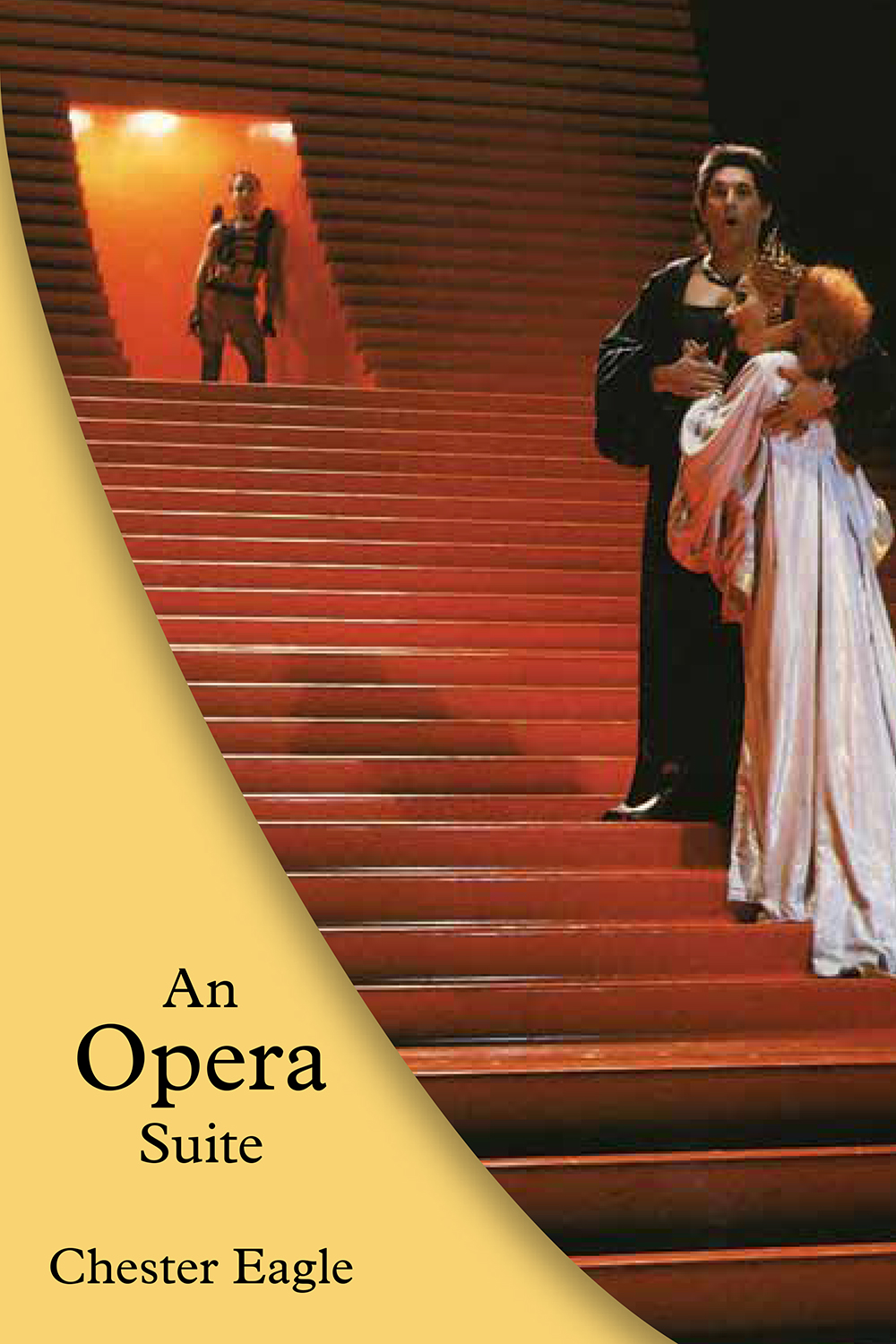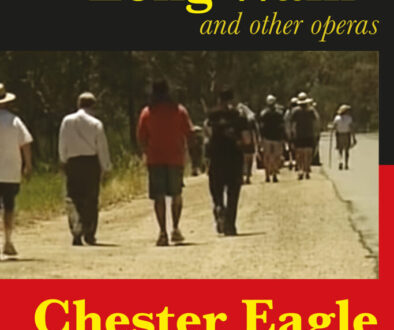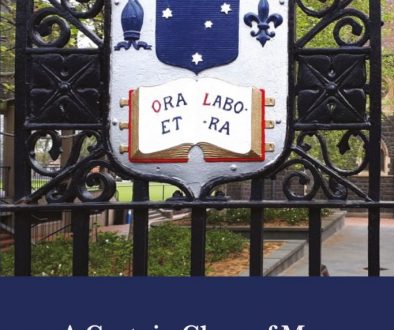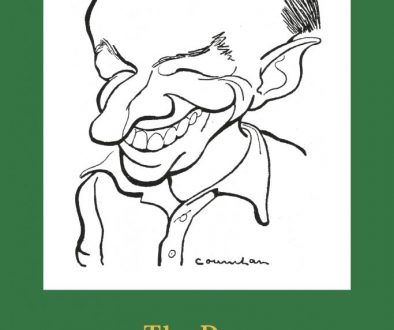An Opera Suite

Written by Chester Eagle
Designed by Karen Wilson
Layout by Karen Wilson
200 copies printed by Design To Print
Circa 2,960 words
Electronic publication by Trojan Press (2014)
First published in Meanjin quarterly volume 49, number 4, 1990, editor Jenny Lee.
An Opera Suite:
They go to the opera at the Palais, a huge converted film house. There’s an attraction between them; they’re skirting around each other. They whisper in each other’s ears. He mentions the triangle in the orchestra, she says there’s no triangle in the orchestra. She’s a third year student at the conservatorium, he can’t read music. But a hundred bars later she whispers, grudging but accepting, ‘Sorry, you were right.’
He enters the Paris opera, hoping for a cheap seat. He joins a long queue. As he nears the ticket box he sees a sign: the only choice left is a seat with no sightline to the stage, or un fauteuil d’orchestre – four hundred francs. Four hundred francs! He looks at the roll in his pocket. ‘It’s not every day I’m in Paris.’ Four hundred francs.
In the dining room of their sexually repressive school, John sits next to Gary. He observes a current of desire running between Gary and Phyllis, the waitress who serves their table. Gary’s eyes follow her and he speaks more softly to her than to anyone else. Gary waits until the exams are over and the final assembly’s about to be held, then he asks Phyllis to go out with him. They meet in the city, away from the eyes of the school. Do they dance, see a film? Do they spend the night at a hotel, or with one of her friends? Do they spend the next day together too? John’s in the quadrangle, waiting for the dinner gong to sound, when Phyllis rushes in late, hurrying to find her uniform.
After dinner, John’s still in the quadrangle, talking, when he sees Gary slouch through the opening under the clock tower. Normally he’s light on his feet, but tonight he’s tired, and changed. He says to John, ‘Come inside and talk to me.’ They enter the tiny cell that is Gary’s study. John senses what’s happened but doesn’t feel he can mention it. He tells Gary – and he’s not sure Gary’s listening – that he’s heard a lot about operas and he’d like to go to one. ‘They’re putting on Don Giovanni next year. It’s supposed to be good, and I’ll be down again by then. I think I’ll go.’ Gary lifts his head. ‘I’m a bit curious myself. I’ll come with you.’
John’s been married a year. On the day that is his wife’s birthday and their anniversary, he gives her the Furtwängler recording of Tristan & Isolde. They’re in front of the fire, listening to the third act. She’s in a deep armchair, following the libretto, and he’s beside her. They’re listening to the long, lonely monologue of Tristan dying …
… of a sword wound, of the lack of Isolde’s healing powers, of the composer’s characterization of him as the one who embraced darkness, night and death in the moment when he could no longer hide his love.
They follow his ravings when the shepherd’s pipe tune changes to signal the ship; they watch, in their imaginations, as he tears loose his bandages and staggers in the bright sunlight, bleeding. They hear his beloved call his name, and then the miracle happens. The music slows to the pulse of the dying man, circling back, weeks in lived time, hours on stage, to the moment when, to the same music, they recognized in each other their passion’s partner and their fate. Tristan sings his last word:
Isolde.
The listeners’ eyes are filled with tears. It’s a long time before they can bear to put on the last side.
In the Paris opera, the chairs are comfortable. Our tourist, who’s dressed from a small suitcase, feels shabby as elegant people brush his knees. But darkness levels them; he knows Falstaff as well, he feels, as anyone around him. He knows Shakespeare, he knows Verdi, he’s one of the spiritual aristocracy who notice every nuance of interpretation. So do your best, Seiji Ozawa, he thinks, and disregard the hisses from somewhere high in the house where the old claques are alive in their bitterness and envy.
Ariadne auf Naxos in the Palais. Arabella, in an old Decca recording, a soprano at the bottom of the stairs, dreaming:
Aber der Richtige …
Der Rosenkavalier in Melbourne’s Princess, the presentation of the silver rose, Baron Ochs’ humiliation, the ecstatic music of renunciation and happiness, sung as the darkness gathers for the civilization that produced it, three women’s voices, intertwining.
John’s in love – he’s not married yet – with the wife of a friend. There are words for most things in opera. What about Sir John Falstaff?
Vorrei che maestro Ford passasse a un miglior vita.
He wishes the death of a friend. No he doesn’t, he denies it, he’s never thought any such thing! He wishes it, but he doesn’t know how to live it. He’s not an operatic character then, is he?
A feeling exists between him and his friend’s wife, but they haven’t expressed it. He hasn’t admitted it to himself. They’re listening one night to Otello, that deadly opera; his seat’s well away from hers. Otello, his jealousy, his madness aroused, is singing; she looks at John. ‘Come beside me,’ she says. He stands, feeling weak, as the Italian made up to be black sings his noble music:
Ora e per sempre addio, sante memorie …
The feelings from which he’s estranged himself are throbbing inside him; he sits on the floor at her feet. She caresses his face, then takes his hand. We’re in trouble,’ she says. ‘We’re in a real fix. Can’t you see it?’
Seiji Ozawa does a good job, despite the hissing, but his Falstaff, though he’s studied the role well, has the voice of a man not yet disillusioned; it’s a firm voice, still in the early stages of ripeness. For all the body padding and ponderous movements, his decadence is applied. But the Queen of the Fairies, abetted by her producer, shows how it should be done. Her on-stage words at the beginning of scene six are given to Dame Quickly, and she’s kept back until Falstaff’s counted the strokes of midnight and become feverish with a desire which he expects not one but two women to satisfy.
E doppia l’aventura!
Slowly, ever so slowly, the Queen of the Fairies comes into view. She’s stunning. She’s black, not with make-up. She’s black. She’s in skin-tight crimson. She’s barefoot, and she trails a crimson cape. She reaches the top of the ramp that is lifting her into view, then she comes down to the audience, a being that’s come in from the night. Ignoring the craven figure under the oak, she comes forward slowly, ever so slowly, brilliant red under a burning white light, singing, singing …
John’s minding the kids because his wife is away. The boy’s at kinder. The girl’s in the back yard, playing in the sandpit. His wife says children are affected by what’s going on in the unconscious of their parents; he’s sceptical. From the back door he watches his daughter. She’s absorbed in what she’s doing; he has a few minutes to himself. He takes out the recording of Tristan und Isolde because it fascinates him – and troubles him. He hasn’t experienced a passion of this all-out intensity, yet, since he responds to the music, the potential to live, to act, in the same way must be there inside him. But it hasn’t happened. What, or who, might trigger it? The danger makes it all the more fascinating …
Habet acht!
Tristan and Isolde sink gently on the flowery bank, invoking night, ready to lose their lives in love’s oblivion. John, alone in the house, becomes aware that he’s trembling. The singers reach the lines that he’s written for his wife on the front of the libretto:
Herz an Herz dir, Mund an Mund …
Einem Atems einz’ger Bund …
These words undo him. He loves his wife, respects her, knows she’s committed to him despite his faults and infidelities, knows too that the blazing excitement he seeks and the wise, delicate intimacy she seeks will never coincide. On the deepest level, it’s a lost cause, and both of them are aware of it. He wants to escape.
The lovers, rapt in each other, hear Brangäne’s warning, and ask themselves if they should heed it. Tristan is willing to die. Death may claim his body but his love is immortal. Isolde wonders about herself if he’s not there: they are still Tristan and Isolde, not yet completely fused, but joined by …
The next passage amuses John because it strikes him as quaint that the lovers in extremis should discuss at some length the süsse wortlein, the simple word-link, the conjunction und. And. Tristan and Isolde. Just as this discussion ends and an erotic trembling rustles through the strings of the orchestra, John hears his daughter crying at the door. Bugger her, he thinks, she would come squalling at this moment. ‘Coming darling,’ he calls, and he rushes through the kitchen. She’s hurt her finger. He kisses it, he rubs it, he carries her back to the lounge where tenor and soprano are giving themselves to each other utterly, that simple word-link and dissolving rapidly in their, and Wagner’s, passion. The tempting concept offered by the music sweeps him up as he’s swept up his daughter to return to this foreign, faraway place, this antipodean Cornwall of centuries before. Although the little girl is in his arms, his mind is in the music and his eyes are following the words, waiting for the moment when Isolde’s maidservant, watching from her tower, warns that light is creeping into the sky:
Habet Acht! Habet Acht!
John’s daughter hates what’s happening. At the very moment when the tumultuous music is capped by the warning from the tower, she screams. She screams and twists herself violently in his arms. ‘Oh curse you, bugger you, fucking hell!’ shouts her father, who sees this cause too is lost. Resentful, confused, almost as bitter and deflated by the interruption as the lovers of legend will be when Melot and King Mark rush in, he turns off the sound machine and takes his crying daughter to the sandpit to find whatever it was that hurt her finger, and give it a well-deserved smack.
They’re in Milan for two days. He says to his wife, ‘Do you realize that’s La Scala?’ They look across the street. A tram passes between them and the building. ‘See if you can get a ticket for tonight,’ she says. He thinks he should stay with her and the children. ‘This chance mightn’t come again,’ says his wife. ‘It means a lot to you. Go and buy a ticket.’
In a gloomy little room off the foyer, a man is sitting at a table. ‘Come back tomorrow at six,’ he says. ‘There will be some seats.’
When it’s time for John to leave the hotel, it’s already dark. His wife says she and the children will come along for the ride. The tram’s crowded, and he’s separated from his wife. Then she’s beside him, her cheeks red. She puts her arm around him, needing him. He asks what’s happened. ‘This man was standing right behind me,’ she says. ‘Did he pinch your bottom?’ She flushes again. ‘Did he try to feel you up?’ He wonders how many of the people around him understand the words. She doesn’t answer, but she stays close to him, and he’s glad that he’s providing an antidote to what’s happened.
The windows of the tram are misted and it’s hard to see where they are. The only exit is at the front, so they push in that direction. His wife and children slip through; he finds himself blocked. ‘I need to get off,’ he says loudly, but there are two shoulders he can’t separate, and his words help him not at all. His family get off, but as he reaches the door it closes in his face. ‘Open up again!’ he commands. The tram moves on. At the next stop he’s first out, and steps down anxiously. In the distance he sees his son and daughter, and their mother, running, skipping, laughing. They’ve been almost able to keep up. When they reach him, right in front of La Scala, the four of them put their arms around each other; it’s one of the happiest moments of their trip. ‘I hope it’s good, darling,’ says his wife. ‘We’ll have a drink somewhere, and then we’ll go back.’
In the horseshoe-shaped theatre his seat is high and directly behind the conductor. After hearing a few bars he decides that the science of acoustics has been going backwards for a couple of centuries. The reverberations die away before the audience moves or claps. He’s never heard anything listened to with such attention. It makes his own listening keener. The next thing that strikes him about the production is that it’s almost as static as a Japanese Noh play. Singers’ hands stay firmly by their sides. The few gestures allowed are extraordinarily telling. The whole thing’s been conceived of as a series of tableaux. When the narrative demands it, characters move into new positions, and then the action ceases so the music can flow. It’s Simon Boccanegra, an opera he doesn’t know.
He reads it by the signs it gives him, and the opening scenes are enacted in the sort of gloom he’s learnt, on this first trip through Europe, to associate with cathedrals. Shrouded, winter-gloomy cathedrals. In fact it’s night, and the characters on the steps outside a grandly porticoed palace are plotting a change of government in Genoa’s city state. Simon Boccanegra, a plebeian sailor who’s rid the seas of pirates threatening Genoa’s trade, Simon Boccanegra, who has a daughter by a patrician woman he’s not allowed to marry, is to be the new Doge. But the child’s been lost, and there can be no reconciliation between the old Doge and the new, between the higher and lower classes, until she’s found.
In the first interval, John talks to the man beside him, telling him how exciting he found Florence after hearing about it for so many years. The Milanese doesn’t want to hear the rival city praised, he wants the tourist to know that Milan’s superior. Has John seen Leonardo’s Last Supper? Then he mustn’t think Florence is such a good place. Has John seen …? He rattles off the innumerable treasures of Milan. John thinks he’s lucky to be at La Scala, and he’s done well to catch an exhibition of Segantini and sculptures by Marini. Do not leave this city, urges the Milanese, until you have seen Leonardo’s Last Supper. John says he’ll try.
Twenty-five years elapse during the interval. The curtain rises on the lost daughter, now a grown woman with a lover. She’s in a setting of almost painful beauty. The stage is glowing with a honeyed light. In simple silhouette are shown the deck, railings and masts of a sailing ship. This has been Boccanegra’s element, but now the plotting, the politics, are destroying him. John’s restless in his seat, he’s squeezing the program in his hands. It’s not so much the drama that’s testing his limits, it’s the golden light, the richness, the luxuriance of the imaginations at work. He wants to leave his seat, take a last lingering look, then rush down the stairs into the freezing night where, without needing to respond, he can savour, at a distance, what’s overwhelming in its presence. He forces himself to stay.
The Milanese goes off for a drink at the second interval. John stays put, afraid that if he gets out of the seat he won’t return to it. He knows he has to undergo the whole experience, not slink away with part of it. He’s surprised that all his years of listening to this sort of music haven’t prepared him: to lose oneself in art is to be lost indeed.
The third act starts. One of the plotters is sent to the scaffold, the wedding hymn of the lost child and her lover rise sweetly from the orchestra. Life and death! At last John sees that that’s what music’s about. He’s used it for years as an imaginative escape, a realm where excitement, passion and the imagination can have full play without any consequences, except those of pleasure. Now he sees: it’s about the same life he leads, or half-leads, it’s a vast public enactment of what’s happening inside him that he only half wants to know about. He feels tremendous pity for Simon Boccanegra, because he’s been poisoned, and at the moment when his daughter’s found, and reconciliation with her noble grandfather is attainable, he’s going to die. Why, in stories, are the only reconciliations, the only resolutions, available in death? If life has to be like that, then John’s not ashamed of having evaded it, as the characters on stage cannot. Surely it must frighten a singer to play a tragic part, night after night? The Doge, the former sailor, comes onto a terrace by the water. He’s weak, his movements are slow. The mood is grim, the backdrop’s steely grey.
Then the magic returns. The grey curtain is lifted slowly by invisible cords, the honeyed light floods the stage, the outline of the ship is seen again, because Simon’s asking why he didn’t find death when he was young, free, in the happy stage of his career. He makes arrangements for his succession, he’s reconciled with his enemy, he staggers, falls, sings a little longer, then the wonderful curtains, which are the sails of freedom and the enclosing walls of necessity, slowly lower themselves to where they were.
The writing of this book:
I was brought up in a farming family which had no comprehension of music. It was a family joke that my father’s brother Teddy couldn’t recognise God Save the King and only stood up for the national anthem (de rigeur in those days!) because everyone else did. My mother whistled when she was washing the dishes, in the belief that she was shaping the melodies she heard in her mind. What she produced was an unending emission of breath with no rise or fall in pitch. And so on. There were farmers around us with a natural gift for music, but it had limited expression in popular song, or the odd chorus from musical comedy. And yet, when the time came, I was surprised to find that I understood music better than I understood almost anything else. I was a natural, and it was very important to me. In the title story of my collection House of Music I describe the way that the European musical tradition was opened up for me. This was a miracle.
I found that I loved music as much as I loved the Australian landscape, two loves which are not always reconcilable. I hope I never have to choose between the two!
I would like to explain now the use of the word ‘suite’ (as opposed to ‘story’) for this piece and An Airline Suite written at much the same time. At that time (1989 – 1990) I felt keenly that I wanted to produce writing that was not particularly governed by any requirements of narrative. I was trying to put experiences down in an apparently unsystematic way, with the reader – I hoped – seeing the various connections and thus building the interpretative response which I as a writer didn’t care to make. This is a way of writing which I didn’t continue in any very apparent way but which underlies a lot, I believe, of what I’ve done since that period. Anyone who has bothered to read my various remarks on this website about the writing of the things on offer will probably have noticed my feeling that pieces of writing write themselves, and the wise writer will let him/herself be used by what wishes to be put down. This approach has been part of my writing for so long now that I don’t question it or think about it very much. The two suites, however – Airline and Opera – came along at a time when the writer as one who used scissors and paste, as opposed to conventional notions of control and shaping, was very strong in my mind.
I hope readers will enjoy these two pieces regardless of their views about the above ideas.



